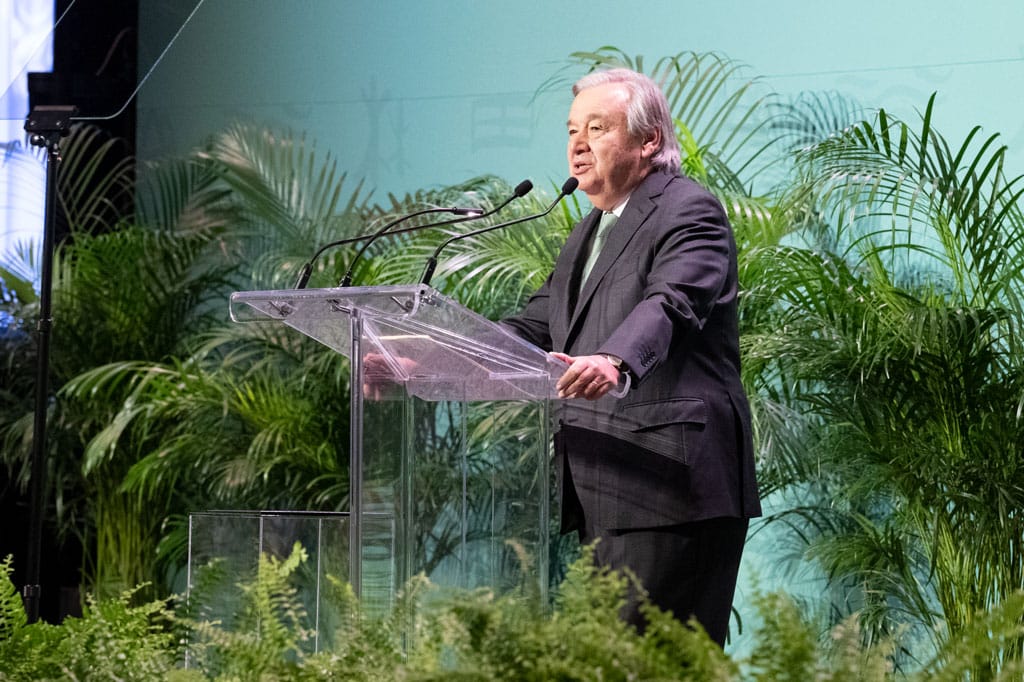In a press conference at COP15, Guterres urged governments and businesses to step up to reverse biodiversity loss and work alongside Indigenous peoples and local communities to protect nature. Meanwhile, Canadian PM Trudeau – who welcomed delegations from 195 countries in Montreal for the 12-day summit – announced his nation’s commitment to fund Indigenous-led conservation projects from now until 2030.
—
“Humanity has become a weapon of mass extinction, with a million species at risk of disappearing forever,” Secretary-General António Guterres said in his opening remarks at the Conference of the Parties to the Convention on Biological Diversity (COP15), the UN conference bringing together 195 countries to discuss a plan to halt and reverse biodiversity loss.
“We are waging a war on nature,” he continued, adding that this war “is ultimately a war on ourselves.“
Speaking on the sidelines of COP15 – which is being described as the “biggest biodiversity conference in a decade” – Guterres urged governments and businesses to take rapid and ambitious action to reverse biodiversity loss and protect “our natural gifts,” adding that this is the ‘only possible way’ to defeat climate change.
As experts have reiterated in recent days leading up to the summit, climate and biodiversity are closely interrelated. On the one hand, extreme weather events can wipe out entire ecosystems, turning crucial carbon sinks into emitters. According to the IUNC, damaged peatlands – the world’s largest natural terrestrial carbon store – account for about 5% of global carbon emissions. On the other hand, preserving ecosystems such as forests and wetlands is one of the best nature-based solutions we have, and might help us deliver up to one-third of the global emissions reductions needed by 2030.
Representatives and negotiations who have gathered in Montreal, Canada, for the 12-day summit, are expected to agree on a Global Biodiversity Framework (GBF), a strategic plan to protect biodiversity which is often compared to the Paris Agreement.
In his opening speech, Canadian Prime Minister Justin Trudeau announced Canada’s C$800 million (US$588 million) commitment to fund Indigenous-led conservation projects in his country over the next seven years. He also urged China, Russia, Brazil, and other nations to expand protected natural areas with Indigenous rights at heart.
“We are putting forward a new model around conservation with Indigenous-led protections with government participation, and even drawing in the private sector and philanthropic initiatives because it is powerful,” Trudeau said according to the Guardian.
“Indigenous communities leading on this is a really good thing. What we’re able to do here is not just show a story of conservation, but a story of reconciliation, about recognizing that it’s these partnerships that are going to be essential going forward,” he added.
In his speech, Guterres also highlighted the importance of Indigenous communities, depicting them as “the most effective guardians of biodiversity” and underscoring the necessity to work alongside them.
Speaking about Indigenous and local communities rights, Policy Director of the Global Forest Coalition (GFC) Simone Lovera, said: “We don’t need to protect the planet from people, but rather ensure people’s rights to protect the planet. We need a new biodiversity framework that truly incorporates and upholds human rights, including Indigenous, women’s, and land rights.”
Featured Image by UN Photo/Evan Schneider
You might also like: What Is COP15? All You Need to Know About the 2022 UN Biodiversity Conference


















